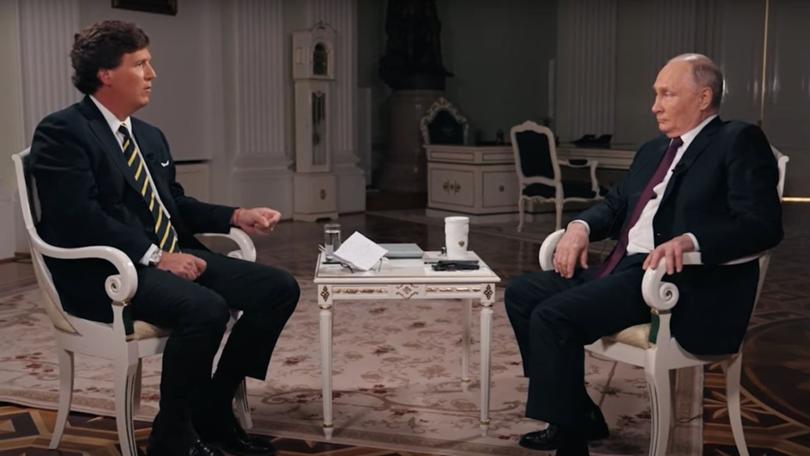Vladimir Putin denies wanting to widen war in rare US interview with Tucker Carlson
President Vladimir Putin says Russia has no interest in attacking Poland or Latvia during an interview with former Fox News host Tucker Carlson.

President Vladimir Putin says Russia will fight for its interests “to the end” but has no interest in expanding its war in Ukraine to other countries such as Poland and Latvia.
In his first interview with an American journalist since before Russia’s invasion of Ukraine nearly two years ago, Putin said Western leaders had come to realise it was impossible inflict a strategic defeat on Russia and were wondering what to do next.
“We are ready for this dialogue,” he said.
Sign up to The Nightly's newsletters.
Get the first look at the digital newspaper, curated daily stories and breaking headlines delivered to your inbox.
By continuing you agree to our Terms and Privacy Policy.Putin also said he believed it was possible to reach an agreement to free US journalist Evan Gershkovich of the Wall Street Journal, who has been detained in Russia for nearly a year and is awaiting trial on spying charges.
Putin made the comments in a more than two-hour interview with conservative talk-show host Tucker Carlson that was conducted in Moscow on Tuesday and aired on tuckercarlson.com.
Asked if he could imagine a scenario in which he would send Russian troops to Poland, a NATO member, Putin replied: “Only in one case, if Poland attacks Russia. Why? Because we have no interest in Poland, Latvia or anywhere else. Why would we do that? We simply don’t have any interest.”
Putin spoke in Russian and his remarks were dubbed into English. He began with lengthy remarks about Russia’s relations with Ukraine, Poland and other countries.
Putin devoted a substantial part of the interview to complaining that Ukraine had been on the verge of agreeing a deal to end hostilities at talks in Istanbul in April 2022 but backed away, he said, once Russian troops withdrew from near Kyiv.
“Well now let them think how to reverse the situation,” he said.
“We’re not against it. It would be funny if it were not so sad. This endless mobilisation in Ukraine, the hysteria, the domestic problems, sooner or later it will result in an agreement.”
The Russian leader said the US had pressing domestic issues to worry about.
“Wouldn’t it be better to negotiate with Russia? Make an agreement. Already understanding the situation that is developing today, realising that Russia will fight for its interests to the end,” Putin said.
Washington, which has sent Ukraine more than $US110 billion ($A170 billion) in aid since Russia invaded in February 2022, has made clear it has no interest in talking on Putin’s terms.
Putin was last formally interviewed by a US media outlet in October 2021, when CNBC’s Hadley Gamble spoke to him.
The Carlson interview came as US lawmakers debate whether to provide more money for Ukraine’s war effort.
Putin said Russian and American special services were discussing the Gershkovich case and had made some progress.
Putin suggested that in return, Moscow wanted Germany to free Vadim Krasikov, who was convicted of the 2019 murder of a Chechen dissident in Berlin, although he did not mention Krasikov by name.
The Kremlin said Putin agreed to the Carlson interview because the approach of the former Fox News host differed from the “one-sided” reporting of the Ukraine conflict by many Western news outlets.
Carlson is considered to have close connections to Trump, who is expected to be the Republican Party candidate in the November US presidential election.
He has called for de-escalation of the war in Ukraine and complained about the billion of dollars in aid the Biden administration has sent to Kyiv.
